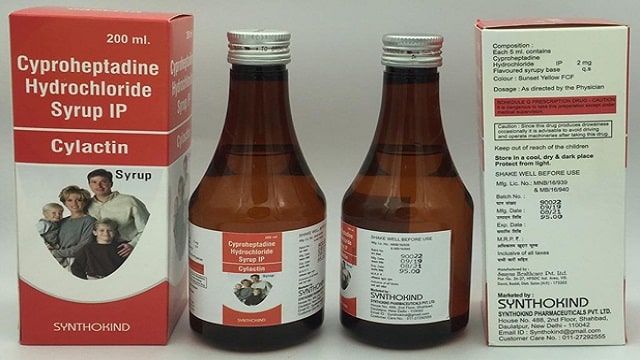Cyproheptadine Hydrochloride
Cyproheptadine hydrochloride is a drug used to treat allergy and migraine symptoms. This drug works by inhibiting histamine in the body. Histamine itself is a chemical that causes allergies.
Drug Trade Names: Profut, Pronam, Ennamax, Esprocy, Bimatonin, Pronicy, Graperide, Cydifar, Erphacyp, Poncohist, and Heptasan.
Manfate Cyproheptadine hydrochloride
Cyproheptadine is useful for relieving red, irritated, itchy, watery eyes, sneezing, and runny nose caused by allergies, airborne irritants, and hay fever. This medicine can also be used to relieve itching in allergic skin conditions, including itching caused by exposure to cold temperatures.
Dosis Cyproheptadine hydrochloride
The dosage used will be adjusted to the condition of the sufferer. In general, here is the dosage for using cyproheptadine hydrochloride:
Allergic Reaction Sufferers
- Children 2-6 years: 2 milligrams, 2-3 times daily. Daily intake limit is 12 milligrams.
- Children aged 7-14 years: 4 milligrams, 2-3 times daily. Daily intake limit is 16 milligrams.
- Adults: 4 milligrams, 3 times daily. Daily intake limit is 32 milligrams.
Rhinitis sufferers
- Children 2-6 years: 2 milligrams, 2-3 times daily. Daily intake limit is 12 milligrams.
- Children aged 7-14 years: 4 milligrams, 2-3 times daily. Daily intake limit is 16 milligrams.
- Adults: 4 milligrams, 3 times daily. Daily intake limit is 32 milligrams.
People with Pruritus
- Children 2-6 years: 2 milligrams, 2-3 times daily. Daily intake limit is 12 milligrams.
- Children aged 7-14 years: 4 milligrams, 2-3 times daily. Daily intake limit is 16 milligrams.
- Adults: 4 milligrams, 3 times daily. Daily intake limit is 32 milligrams.
Urticaria sufferers
- Children 2-6 years: 2 milligrams, 2-3 times daily. Daily intake limit is 12 milligrams.
- Children aged 7-14 years: 4 milligrams, 2-3 times daily. Daily intake limit is 16 milligrams.
- Adults: 4 milligrams, 3 times daily. Daily intake limit is 32 milligrams.
How to Use Cyproheptadine hydrochloride
- Read the instructions on the medicine packaging before using it.
- Follow the doctor’s advice.
- Consume before or after meals.
- Use regularly at the same time every day.
- Do not stop using Cyproheptadine Hydrochloride without consulting your doctor.
- Store at room temperature.
- Keep away from direct sunlight and damp places.
- Keep out of reach of children.
- Do not refrigerate or freeze.
Things to Consider When Using Cyproheptadine hydrochloride
You should not use Cyproheptadine hydrochloride if you have glaucoma, stomach pain, enlarged prostate, problems urinating, or if you are having an asthma attack.
You should also not take this medicine if you are breastfeeding, elderly, or have an immune-related disease. Also avoid taking this medicine if you have used an MAO inhibitor in the last 14 days, such as isocarboxazid, linezolid, methylene blue injection, phenelzine, rasagiline, selegiline, or tranylcypromine.
Cyproheptadine hydrochloride Side Effects
Side effects that usually appear in Cyproheptadine hydrochloride users are:
- Feeling confused.
- Hallucinating.
- Convulsions.
- Having a hearing impairment.
- Heart pounding.
- Bleeding easily.
- The frequency of urination will increase or decrease.
- Changes in skin color to become paler.
- Urine is darker in color.
- Feeling tired.
- Fever
- Always feel sleepy.
- A spinning sensation in the head.
- Feeling very restless or very excited.
- Having trouble sleeping, such as insomnia.
- A sensation of numbness in certain areas of the body.
- Tingling in certain areas of the body.
- Having vision problems, such as blurred vision.
- Experiencing changes in appetite.
- Dry mouth or nose.
- Experiencing stomach problems, such as diarrhea or constipation.
Interaksi Cyproheptadine hydrochloride
If your doctor recommends you to take this medicine, it means that the doctor has considered the benefits to be greater than the effects. This medicine will have an impact on interactions if taken with the following medicines:
- Metyrapone.
- Selegiline.
Serious interactions may occur if taken with:
- Desvenlafaxine.
- Eluxadoline.
- Isocarboxazid.
- Phenelzine.
- Procarbazine.
- Sodium oxybate.
- Tranylcypromine
Kontraindikasi Cyproheptadine hydrochloride
Cyproheptadine Hydrochloride should not be used in people with the following health conditions:
- Having bladder neck obstruction, which is a blockage that occurs at the base of the bladder, so that the flow of urine that should be flowing out of the body is reduced or even stopped.
- Suffering from peptic ulcer stenosis, which is damage to the mucosal, submucosal, and muscular layers of the digestive tract due to excessive stomach acid.
- Having glaucoma, which is damage to the optic nerve due to increased pressure on the eyeball.
- Nursing mothers, the elderly, and children.

